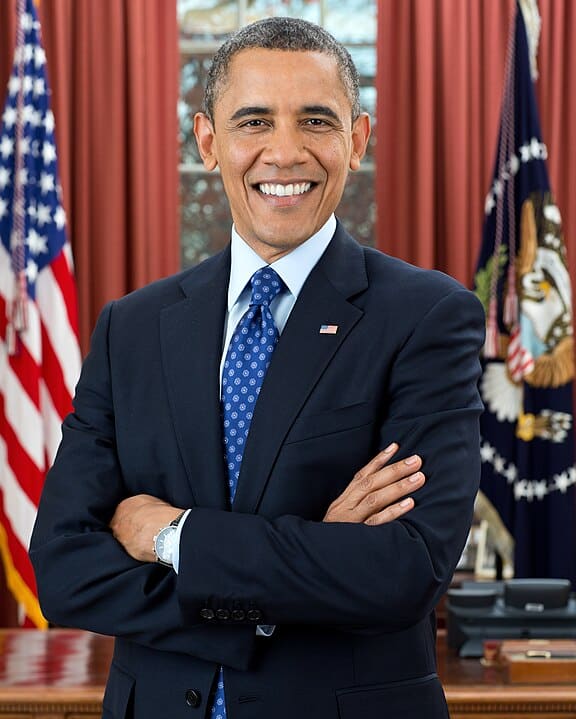Barack Hussein Obama was born in Hawaii in 1961 to an American mother and a Kenyan father. He earned a bachelor’s degree from Columbia and a law degree from Harvard University, where he served as president of the law review.
After working as a civil rights attorney and teaching at the University of Chicago Law School, he was elected to the Illinois Senate and to the U.S. Senate. He delivered the keynote address to the Democrat National Convention in 2004, and defeated Hillary Clinton to gain the party’s presidential nomination in 2008.
During his two terms as president from 2009 to 2017, Joe Biden served as his vice president. From 2009 to 2015, Hillary Clinton was his Secretary of State.
Obama was the first person of African American ancestry to serve as a U.S. president, and he was the subject of considerable misinformation, including false claims by Donald Trump and others that he had not been born in the U.S.
Obama promoted religious freedom in foreign policy
Obama emphasized the multi-racial, multi-cultural aspects of America. In his first inaugural address, he observed that “We are a nation of Christians and Muslims, Jews and Hindus, and non-believers. We are shaped by every language and culture, drawn from every end of the earth.”
In 2016, Obama signed an amendment to the International Religious Freedom Act, which promotes religious freedom as a foreign policy of the United States, that specifically recognized that “the freedom of thought, conscience, and religion is understood to protect theistic and non-theistic beliefs and the right not to profess or practice any religion” (Johnson 2016).
Obama appointed Sotomayor, Kagan, to Supreme Court
As president, Obama appointed Sonia Sotomayor (the first Hispanic American) and Elena Kagan to the U.S. Supreme Court, both of whom are generally considered to be liberals. Obama successfully advocated for health care reform; decided not to defend the Defense of Marriage Act (DOMA), which limited marriage to heterosexual couples; and used an executive order known as DACA (Deferred Action for Childhood Arrivals) to protect the children of undocumented immigrants from deportation. In a covert operation, Obama’s Administration successfully hunted down and killed Osama bin Laden in Pakistan in 2011.
In his presidential proclamation of Bill of Rights Day in 2016, Obama classified “freedoms of speech, worship, and assembly” as among “our most fundamental liberties and rights.” Although Obama sometimes criticized videos that he believed flamed religious and racial hatred, he reacted strongly when radical Islamists committed terrorism in response to a caricature of the Prophet Muhammad in the publication Charlie Hebdo.
On that occasion, Obama observed that “The fact that this was an attack on journalists, an attack on our free press, also underscores that these terrorists fear freedom of speech and freedom of press. A universal belief in the freedom of expression is something that can’t be silenced because of the senseless violence of a few.” (Gerstein 2015)
Hobby Lobby says birth control coverage violates religious freedom
Obama is generally considered to be a defender of the First Amendment although some of the legislation he helped to adopt, including the Affordable Care Act known as Obamacare, sometimes brought First Amendment lawsuits by employers such as Hobby Lobby and religious institutions that did not think they should be required to provide birth control or abortion services within their health care plans.
In Burwell v. Hobby Lobby Stores, Inc. (2014), the Supreme Court ruled in a 5-4 decision that the Religious Freedom Restoration Act could be applied to corporations and that the regulations requiring company health plans to cover contraceptives or pay heavy fines burdened the exercise of religion of the company’s owners.
In a speech with important implication of the religious provisions of the First Amendment, Obama reflected deeply on the relationship between faith and governmental policy in a “Call for Renewal” that he delivered to a group of progressive evangelical Christians when he was running for the U.S. Senate.
He was particularly concerned about what he perceived to be the growing divide between “religious America and secular America” but reminded progressive Christians of the role that religious rhetoric had played in the civil rights and other movements (Vile 2020, 374-367). Obama later distanced himself from inflammatory statements made by Jeremiah Wright, the pastor of the Trinity United Church of Christ in Chicago that Obama attended.
Obama commutes prison sentence for sharing classified documents
Obama was able to use his speeches at the White House Correspondent’s Dinner to skewer opponents with wit.
In 2017, Obama commuted the remaining prison sentence of Chelsea (previously Bradley) Manning for releasing classified documents to WikiLeaks related to America’s participation in Iraq.
Obama supported amendment to reverse of campaign finance ruling
Obama has advocated a constitutional amendment to reverse the Supreme Court in Citizens United v. Federal Election Commission (2010). In that case, the court found unconstitutional under the First Amendment a provision in the Bipartisan Campaign Reform Act of 2002 that limited spending by unions and corporations on express advocacy and electioneering. The court said the provision limited political speech of corporations.
The case involved the funding a film highly critical of Hillary Clinton when she was running against Obama for the 2008 presidential nomination of the Democratic Party. Some believed the decision would lead to more spending by companies to influence elections.
Since leaving the presidency, Obama has also suggested that Section 230 of the Communications Decency Act of 1996 should be revised to provide greater accountability for disinformation on social media platforms (Feiner 2022).
John Vile is a professor of political science and dean of the Honors College at Middle Tennessee State University. This article was published on Jan. 14, 2024.

